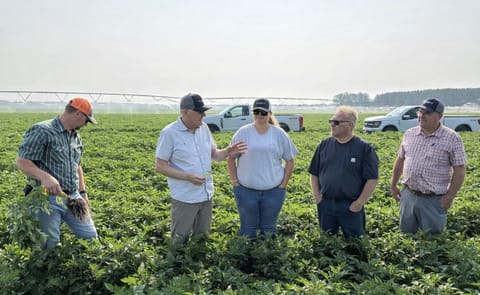Producers were reporting storage concerns this winter as they struggled with frost-damaged potatoes and extreme cold.
(Courtesy: Potato Growers of Alberta)
Primaire tabs
Expanding potato sector in Manitoba not stressing on seed, despite tight supplies

Manitoba’s potato sector is gearing up to supply an expanding industry but seed supplies will be tight after a tough harvest last season.
J.R. Simplot’s $460-million expansion of its Portage la Prairie plant is expected to double the operation’s need for tubers when it comes online this fall.
Why it matters:
Manitoba’s potato sector is in line for expansion with a major processing boost waiting in the wings, but the sector also faces tight seed potato supplies after a tough fall.Leonard Rossnagel, retired potato agronomist and former director with the Seed Potato Growers Association of Manitoba, says the industry has already planned for tight seed potato supplies:
“Because potato growers knew of the difficulties with last fall’s harvest on their own farms and, knowing that a lot of seed potatoes are grown in the province and could experience some of the same issues, they were cognizant of the fact that seed would be in short supply and secured their seed needs early.”
(Click to enlarge)
Both McCain and J.R. Simplot also tried to release their potential production requirements early to help with planning, he added.
Simplot’s expansion has increased seed potato demand on the heels of a tough harvest season. (Courtesy: Dave Bedard / Manitoba Co-operator)
Less damage?
Seed potatoes were not as hard hit as processing potatoes last year, Rossnagel said.
Thousands of potato acres were left unharvested for the first time in recent memory in 2018 after an October frost froze fields several inches deep.
Keystone Potato Producers Association president Dan Sawatzky estimated that about 5,200 acres went unharvested last year during a meeting of the Keystone Agricultural Producers in November.
Growers later reported storage issues, adding to the fall damage. Despite efforts to increase airflow through storage piles, Sawatzky said that some frost-damaged potatoes had been harvested late in an effort to salvage the crop, and later spoiled.
Farmers reported extra storage concerns in January, including some concern over early-dug potatoes that missed the frost, but were hit with wet conditions. Extreme cold over the winter, likewise, created worry over aeration.
Seed potatoes may not have been hit by that killing frost in the same way processing potatoes were, given their earlier harvest date, according to Rossnagel:
“That being said though, supplies would have been tight even without the weather.”He said, adding that the sector has brought seed potatoes in from Saskatchewan and Alberta to make up the shortfall.
Simplot has said that the expanded plant will be fully operational by 2020.
The company announced the $460-million expansion in February 2018. When complete, the project will over double the floor space of the plant from 180,000 to 460,000 square feet and, according to the initial release from the company, add 87 full-time jobs.
Dan Sawatzky, Keystone Potato Producers Association President:
“Generally, people are glad for the opportunity. These kinds of tough harvests are not the norm, so I guess certainly that harvest has made them aware of the potential risks that maybe have always been there, but last year’s harvest brought it to the forefront.”The incoming expansion, which promises to be a major boost for local potato growers, is at odds with the memory of 2018’s historically difficult harvest.
“I think the way that farmers are treating it is that they are anticipating, going forward, that, that kind of a fall won’t repeat itself for a number of years.”
The dichotomy has created some mixed feelings among potato growers, Sawatzky said, although Rossnagel doubts such feelings will impact the expected expansion in acres:
“Growers will not generally plant process potatoes on spec. Given that the cost of producing potatoes is in the $3,000-an-acre range, they cannot afford to grow potatoes on spec.”He has, in fact, heard a number of producers planning capital upgrades to keep up with the rise in demand.
“This new plant expansion will certainly be requiring more potatoes, so there will be more potatoes planted.”
Like to receive news like this by email? Join and Subscribe!
Get the latest potato industry news straight to your WhatsApp. Join the PotatoPro WhatsApp Community!
Uitgelichte Bedrijven
Sponsored Content
Sponsored Content
Sponsored Content
Sponsored Content










